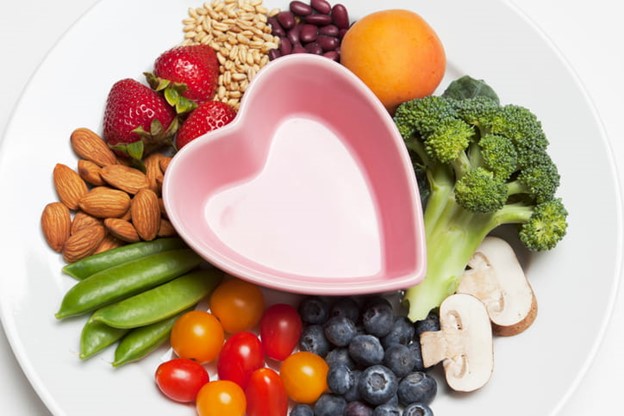In 2021, 695,547 people in the U.S. died from heart disease, making it the leading cause of death in the nation — deaths from strokes ranked number five, claiming 162,890 lives.
Maintaining your heart health can prevent severe health issues and expensive medical bills, as well as help prevent premature death. Perhaps you or someone you know had a heart-related health issue, your family has a history of heart disease, or you’re aware of the importance of heart health. These are reasons you may be motivated to take steps to improve your heart health.
Consuming a heart-healthy diet promotes cardiovascular health. Eating healthy foods for your heart can prevent or reduce plaque buildup in your arteries, which can cause heart attacks, coronary artery disease, and strokes.
Schedule your CT scan.
What Are the Basics of a Heart-Healthy Diet?
Following four basic rules will help you maintain a heart-healthy diet.
Consume Healthy Portions
Portion size is a crucial aspect of a heart-healthy diet. Upsizing orders has prompted many to fall into the habit of overeating at meals. Overconsumption increases the risk of obesity, which applies to overconsumption of healthy and unhealthy foods. Your calorie count affects your ability to lose weight, and consuming too many calories contributes to weight gain, which increases your risk of severe health issues, including diabetes and heart disease.
Consume Heart-Healthy Foods
You can develop a heart-healthy diet by emphasizing the following food categories in your menu:
- Fruits
- Lean protein
- Vegetables
- Whole grains
Restrict Consumption of Unhealthy Foods
Unhealthy foods don’t fulfill nutritional needs, and they are the primary reason people develop health issues such as atherosclerosis (arterial plaque) and high blood pressure. They also contribute to weight gain.
Plan Ahead To Stay in Control
Anyone can oversleep and find themselves rushing in the morning or get stuck in traffic and decide to order takeout instead of cooking dinner. Life happens. However, you can promote a heart-healthy diet by planning your menu as much as possible. Planning meals allows you to count calories, meet your nutritional needs, and avoid consuming unhealthy foods.
What Are the Healthiest Foods for Your Heart?
Foods healthy for your heart include the following:
- Fruits
- Healthy proteins
- Low-fat dairy
- Nuts
- Salmon
- Seeds
- Tuna
- Vegetables
High-fiber foods, such as broccoli, help prevent atherosclerosis. Avocados help prevent plaque buildup and help you maintain a healthy blood pressure. Berries fight inflammation and protect heart health.
When choosing oil for cooking and dressings, opt for olive oil. Olive oil has anti-inflammatory properties that promote cardiovascular health.
Healthy proteins include fish, nuts, seeds, legumes, skinless turkey, skinless chicken, and 95% lean ground beef.
Low-fat or non-fat dairy is essential to your diet because dairy provides essential nutrients, such as vitamin D and calcium. In addition to promoting bone health, low-fat and non-fat dairy consumption helps maintain heart health. Heart-healthy low-fat and non-fat dairy options include the following:
- Fat-free cheese
- Fat-free milk
- Fat-free yogurt
- 1% milk
- Low-fat yogurt
- Soy milk
- Soy yogurt
Dark chocolate is a heart-healthy food you can consume without compromising your heart-healthy diet.
What Foods Are Bad for Your Heart Health?
Prioritizing heart-healthy foods is one part of creating and maintaining a heart-healthy diet. The other part involves restricting unhealthy foods that can damage your heart’s health.
Highly Processed Foods
Highly processed foods deliver high volumes of salt, sugar, and saturated fats. Highly processed foods include the following:
- Burgers
- Cake
- Candy
- Deli meats
- Dressings
- French fries
- Frozen pizzas
- Gravy
- Ice cream
- Jams
- Muffins
- Potato chips
- Pretzels
- Sauces
- Sausages
- Sugary drinks
- Syrup
Consuming highly processed foods contributes to weight gain and cardiovascular disease.
Saturated Fats
Animal byproducts are a primary source of saturated fats. These fats contribute to higher unhealthy cholesterol rates, which can cause cardiovascular problems. Foods containing saturated fats include high-fat cheese, red meat, and butter.
Sodium
Adding salt to your diet increases your risk of water retention, which triggers a series of health issues that ultimately affect your heart’s health. Salt is a common preservative, and the volume in the average person’s diet is already enough to deliver this mineral’s health benefits. Adding tiny amounts for taste is okay, but restricting salt intake promotes a heart-healthy diet.
Sugar
Inflammation and hypertension are two of the byproducts of excessive sugar intake. Since inflammation and hypertension can cause coronary artery disease, avoiding foods with excessive amounts of sugar helps prevent cardiovascular health issues.
Trans Fats
Trans fats are primarily found in meat and dairy products. Overconsumption of trans fats increases the risk of stroke and heart attack because these fats raise your bad cholesterol levels.
How Can You Keep Your Heart Healthy?
Consuming a heart-healthy diet is an excellent way to keep your heart healthy. In addition to consuming heart-healthy foods, there are several other things you can do to improve or retain your cardiovascular health, including the following:
- Exercise
- Limit alcohol consumption
- Maintain a healthy weight
- Manage your stress
- Quit smoking

